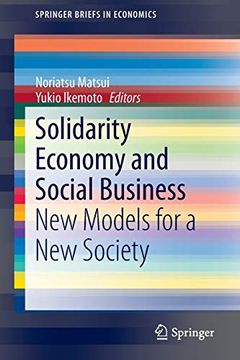Share
Solidarity Economy and Social Business: New Models for a new Society (in English)
Matsui Noriatsu,Ikemoto Yukio (Author)
·
Springer Verlag Gmbh
· Paperback
Solidarity Economy and Social Business: New Models for a new Society (in English) - Matsui Noriatsu,Ikemoto Yukio
$ 52.09
$ 54.99
You save: $ 2.90
Choose the list to add your product or create one New List
✓ Product added successfully to the Wishlist.
Go to My WishlistsIt will be shipped from our warehouse between
Wednesday, July 03 and
Thursday, July 04.
You will receive it anywhere in United States between 1 and 3 business days after shipment.
Synopsis "Solidarity Economy and Social Business: New Models for a new Society (in English)"
This book presents theoretical examinations of why and how connecting people yields different results from those of the market mechanism alone. With an ever-greater disparity between the world's rich and poor, actions have been taken to remove the imperfections and remedy malfunctions of the market mechanism. An underlying theme of these activities is to connect people and make them directly visible to one another; thus the integrating concept of the "solidarity economy" emerges. This volume analyzes diverse examples and practices of solidarity economy. Adam Smith emphasized the importance of "sympathy" among people and the role of the "impartial spectator" in order to control otherwise reckless markets. These major concepts form the basis of a solidarity economy. The examples and practices in this book are based on this framework. The first is the idea of social business, promoted by Prof. M. Yunus of the Grameen Bank. Although the group of five members in the Grameen Bank organization is considered a system of mutual surveillance by some economists, it is not a system based on distrust but a mechanism for mutual help and encouragement. Also examined in this book is organic agriculture, which adheres to the necessity of face-to-face relationships. It pursues environmental concerns and food safety by bringing together consumers and producers in local areas and by sharing knowledge. When consumers and producers are widely separated, a system of certification assures consumers that no chemical pesticides and fertilizers are used. Connecting consumers and producers through certification systems can be seen as part of fair trade mechanisms. These mechanisms are applied in certified coffee programs, for instance, to reduce poverty, to protect the environment, and to safeguard human rights. This book proposes that all these seemingly different types of activities can be understood as part of the solidarity economy. With this unifying theme, the book will be useful for both theoretical investigations and practical applications.
- 0% (0)
- 0% (0)
- 0% (0)
- 0% (0)
- 0% (0)
All books in our catalog are Original.
The book is written in English.
The binding of this edition is Paperback.
✓ Producto agregado correctamente al carro, Ir a Pagar.

